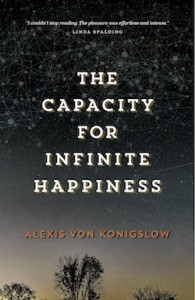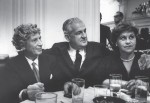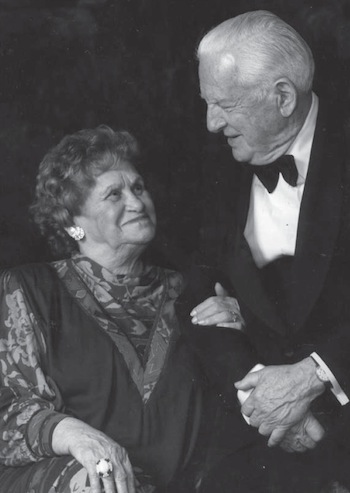It’s a wonderful concept. A family flees from Russia in 1928. By 1933, they are running a lodge in Canada – the only place Jews can stay. Among their more known guests are the Marx brothers, in particular for the plot, Harpo. Jump to 2003 and the fourth generation, Emily Kogan runs away to her family’s lodge to escape her unraveling PhD thesis. While her academic future remains uncertain, her research brings clarity of her family’s history and of the connections that truly matter.
 The Capacity for Infinite Happiness (Buckrider Books) by Alexis von Konigslow is a solid first novel. Von Konigslow is a talented writer with a gift for language and storytelling. Straight away, she sets up the mystery and the tension, describing the scene as Emily’s great-grandmother, Ayala, prepares to flee Russia with her husband and daughter, Blima, Emily’s grandmother:
The Capacity for Infinite Happiness (Buckrider Books) by Alexis von Konigslow is a solid first novel. Von Konigslow is a talented writer with a gift for language and storytelling. Straight away, she sets up the mystery and the tension, describing the scene as Emily’s great-grandmother, Ayala, prepares to flee Russia with her husband and daughter, Blima, Emily’s grandmother:
“Pay attention,” said the tall man.
He was so long that he seemed to be folded into the hallway. He was standing close to Blima’s mother, his big hands around her smaller ones, pressing papers into her palms. Blima had seen this man before, and she hadn’t liked him then either. She backed away, quietly so that they wouldn’t know she was there.
“Ayala, I need you to listen to me,” the man said again.
Ayala bowed into his chest. Blima shivered.
“I don’t want you to panic, or pretend that you’re bored. Here’s what I want you to do. When the officials ask to see your papers, I need you to pinch the little girl, pinch her hard. Don’t tell your husband that you’re going to do it. That way, she’ll be crying, you’ll both be concerned, everyone will want the scene to be over.”
Blima crouched down. She was the only little girl in the house.
“Also, make sure that your shirt is unbuttoned,” the man said, touching her mother’s blouse. “That will help.”
“I don’t want to do this,” said Ayala.
“As a plan, it’s perfectly safe. You’ll send these back by post. We’ll be together again before the end of the year.”
The questions that arise from this opening passage, notably about the man helping Ayala and her family, are central to the novel and keep you reading as it struggles to find its feet. The book’s format, which alternates between Harpo’s 1933 visit to the lodge and Emily’s 2003 visit, interrupts the flow at first and doesn’t become a tension-increasing device until about two-thirds of the way into the book. As well, while von Konigslow’s poetic writing is succinct, it is also repetitive on a few points: Harpo’s concerns about whether he’d make a good father; whether or not William, who Harpo meets in the woods on more than one occasion, is a real person or a figment of the actor’s imagination; and Emily’s ruminations about her thesis and her successive excuses for putting it off.
For almost 200 pages, The Capacity for Infinite Happiness is an OK read; its last 100-plus pages, however, as it becomes more focused and races towards “the reveals,” are excellent. A few minor edits would have made the novel a standout from start to finish. As it is, it is still worth reading for its unique premise, the quality of writing and its insights into Jewish life in the first half of the last century, the meaning of family, how we impact each other even across generations and, most important, love.



